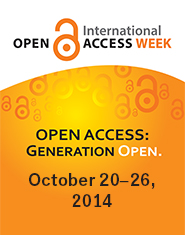Open Access Week, a global event now entering its eighth year, is an opportunity for the academics and researchers to continue to learn about the potential benefits of open access, to share what they’ve learned with colleagues, and to help inspire wider participation in helping to make open access a new norm in scholarship and research. (from the Open Access Week website)
This week, the Dalhousie Libraries will be doing a blog post a day on different topics related to open access, as well as hosting two events.
What about Open Access and the Humanities?
Much of the success of the open access movement can be seen in the scientific community which over the course of a decade has established many well-regarded open access publishing ventures such as the Public Library of Science (PLoS).
In contrast, humanists have been hesitant to embrace open access. Part of the hesitation comes from the challenge of author processing charges (APCs). While the science community is more accustomed to scholarly communication process which include page charges, the model of authors paying some portion of publication costs is less common in humanities publishing. As well, unlike scientists, humanists tend to be focussed on publishing sustained arguments in book form rather than articles in journals.
That said, a number of important initiatives are underway in the humanities.
Knowledge Unlatched is a UK initiative that focuses on open access monographs. The Knowledge Unlatched approach shifts the business model away from author processing charges to libraries paying publishers to make books open access. A group of libraries identifies a list of books that they think should be made open access and pool together money to pay the publisher a single, collective fee for each title. The fee is based on what the publisher calculates as a cost of publishing the book. If the libraries agree to the fee, the title is released as an open access PDF free of digital rights management (DRM) with a Creative Commons license. On average, libraries pay $43 per library per book and publishers receive $12,000 per book. To date, 300 libraries have signed up and 28 books have been made open access under this model.
The Open Library of the Humanities (OLH) is a journal initiative modelled on PLoS. Here too the business model is based on collective rather than competitive purchasing by libraries.
The megajournals lower publication costs by offering hundreds of articles on a single publishing platform for peer review and article delivery and thus benefit from an economy of scale.
In a universe where 3,000 to 4,000 articles are published each day, megajournals like PLoS and OLH can help researchers keep up with work in their field by providing a single disciplined based location for article discovery. Like PLoS, OLH is betting that the discoverability of an article plays a much larger role than journal reputation in having an article read.
OLH plans to use existing journals in the humanities as part of a transitional to a full megajournal defined as “a high volume academic publication venue that reviews, publishes and then hosts in perpetuity, high-hundreds to potentially thousands of articles per year.”
You can learn more on the OLH website and read Martin Eve’s latest article “All That Glisters: Investigating Collective Funding Mechanisms for Gold Open Access in Humanities Disciplines.”
To hear more about the intricacies of open access publishing and the humanities, today at 4 p.m. we will be hosting a panel discussion with the Associate Dean Research of the Faculty of Arts and Social Sciences, a Dalhousie librarian, and the editor in chief of McGill Queen’s University Press:
Differing Perspectives on Open Access: a panel discussion
Thursday, October 23/4–5:30 p.m.
Room 224, Student Union Building
We will also be hosting this event on Friday:
Open Access at MIT Press: OA in a large university press
Friday, October 24/1 p.m.
Room 2616, Killam Memorial Library


